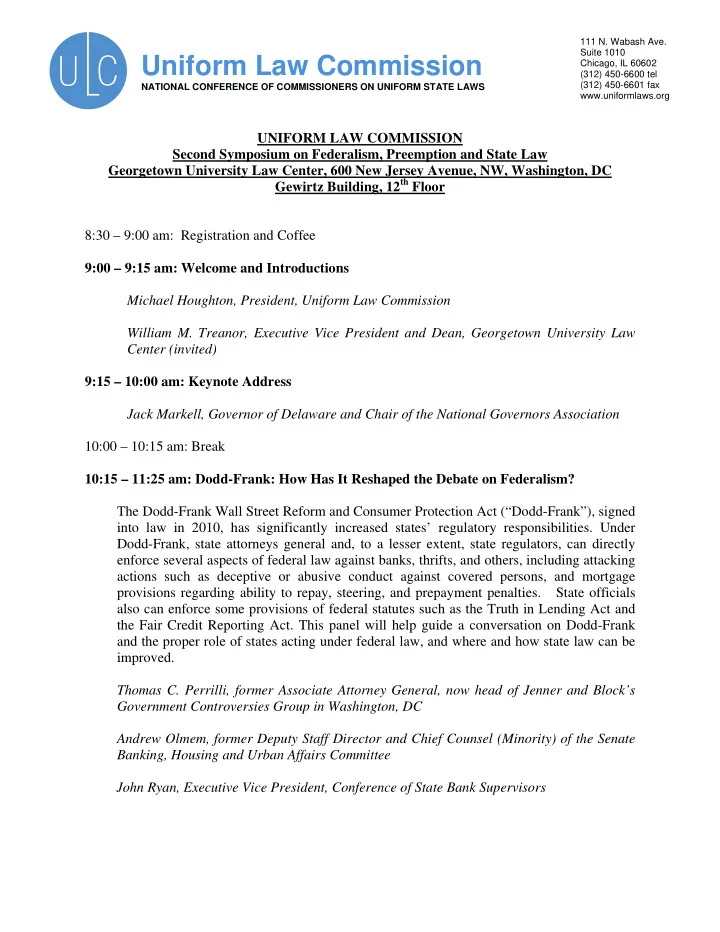

111 N. Wabash Ave. Suite 1010 Uniform Law Commission Chicago, IL 60602 (312) 450-6600 tel (312) 450-6601 fax NATIONAL CONFERENCE OF COMMISSIONERS ON UNIFORM STATE LAWS www.uniformlaws.org UNIFORM LAW COMMISSION Second Symposium on Federalism, Preemption and State Law Georgetown University Law Center, 600 New Jersey Avenue, NW, Washington, DC Gewirtz Building, 12 th Floor 8:30 – 9:00 am: Registration and Coffee 9:00 – 9:15 am: Welcome and Introductions Michael Houghton, President, Uniform Law Commission William M. Treanor, Executive Vice President and Dean, Georgetown University Law Center (invited) 9:15 – 10:00 am: Keynote Address Jack Markell, Governor of Delaware and Chair of the National Governors Association 10:00 – 10:15 am: Break 10:15 – 11:25 am: Dodd-Frank: How Has It Reshaped the Debate on Federalism? The Dodd-Frank Wall Street Reform and Consumer Protection Act (“Dodd-Frank”), signed into law in 2010, has significantly increased states’ regulatory responsibilities. Under Dodd-Frank, state attorneys general and, to a lesser extent, state regulators, can directly enforce several aspects of federal law against banks, thrifts, and others, including attacking actions such as deceptive or abusive conduct against covered persons, and mortgage provisions regarding ability to repay, steering, and prepayment penalties. State officials also can enforce some provisions of federal statutes such as the Truth in Lending Act and the Fair Credit Reporting Act. This panel will help guide a conversation on Dodd-Frank and the proper role of states acting under federal law, and where and how state law can be improved. Thomas C. Perrilli, former Associate Attorney General, now head of Jenner and Block’s Government Controversies Group in Washington, DC Andrew Olmem, former Deputy Staff Director and Chief Counsel (Minority) of the Senate Banking, Housing and Urban Affairs Committee John Ryan, Executive Vice President, Conference of State Bank Supervisors
2 11:30 am – 12:30 pm: Agency Preemption? Don’t Bank On It. Following the May 2009 Presidential Memorandum on Preemption, Professor Catherine Sharkey authored a Report for the Administrative Conference of the United States (ACUS), “Agency Procedures for Considering Preemption of State Law” (adopted in 2011), which proposed various agency reforms for implementing the preemption provisions of Federalism Executive Order 13132, and which also evaluated evidence in support of preemption. [Executive Order 13132 is a Clinton administration order that stated that “preemption of State law by executive departments and agencies should be undertaken only with full consideration of the legitimate prerogatives of the States and with a sufficient legal basis for preemption.”] The OCC (Office of the Comptroller of the Currency) was featured prominently in the Sharkey study as an agency that had engaged in aggressive regulatory preemption, prompting Congress to rein in the agency in the 2010 Dodd-Frank Act. Professor Arthur Wilmarth has written extensively on the Dodd-Frank Act’s expansion of state authority to protect consumers of financial services. And Professor Rick Hills has written on the conflict-ridden history of American banking nationalism and Dodd-Frank preemption. The panelists will engage in a discussion of the Dodd-Frank preemption provisions and the future of OCC preemption as well as its broader ramifications for thinking more generally about Congressional, executive, and judicial review of agency preemption. Professor Catherine Sharkey (New York University School of Law) Professor Arthur Wilmarth (George Washington University Law School) Professor Roderick (Rick) Hills (New York University School of Law) 12:30 - 1:45 pm: Buffet Lunch with Speaker Senator Jim Risch (ID) 2:00 – 3:00 pm: How Can Federalism Thrive Given the Political Pressures that Affect Policy Creation? David Askew, Director of the White House Office of Intergovernmental Affairs (invited) Dan Crippen, Executive Director, National Governors Association (invited) Susan Frederick, National Conference of State Legislatures Michael A. Scodro, Solicitor General of Illinois State Senator Gary Stevens (Alaska), Chair, Council of State Governments
3 3:00 – 3:15 pm: Break 3:15 – 4:00 pm: Discussion of the ULC Draft Principles of Federalism The ULC has developed draft “Principles of Federalism” that the ULC commends to institutions and individuals which, like the ULC, deal regularly with matters that lie on the boundaries of state and federal law. Panelists will comment both on the recommendations contained in the Draft Principles and on ways to garner attention to and responses concerning the Draft Principles. Raymond Pepe, Chair of the ULC Committee on Federalism and State Law Christopher Cushing, Nelson Mullins Public Strategies Judge Gregory Mize, Judicial Fellow, National Center for State Courts 4:00 – 5:00 pm: Current Issues Relating to Federalism and Preemption In this concluding session the panelists will comment on some of the major themes raised in the discussions during the Symposium and on other current federalism issues. Ample time will be reserved for comments and questions from Symposium participants. Michael Houghton, President, Uniform Law Commission (moderator) Thomas C. Perrilli, former Associate Attorney General, now head of Jenner and Block’s Government Controversies Group in Washington, DC Professor Catherine Sharkey (New York University School of Law) Additional panelists to be determined
Recommend
More recommend